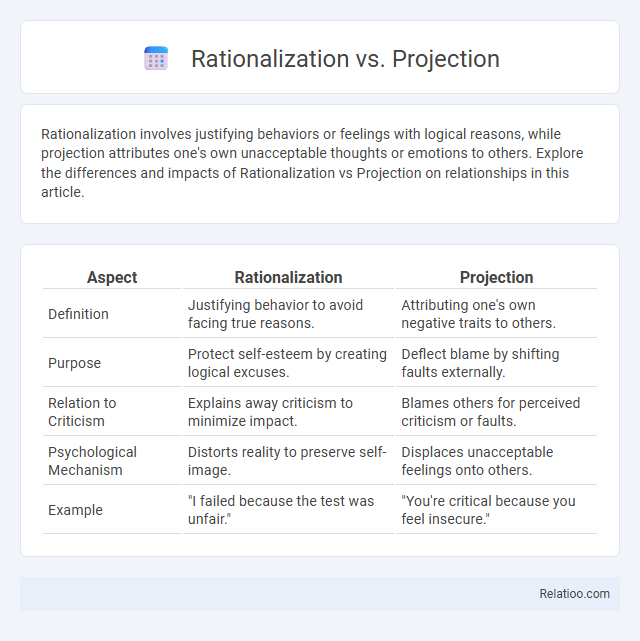Rationalization involves justifying behaviors or feelings with logical reasons, while projection attributes one's own unacceptable thoughts or emotions to others. Explore the differences and impacts of Rationalization vs Projection on relationships in this article.
Table of Comparison
| Aspect | Rationalization | Projection |
|---|---|---|
| Definition | Justifying behavior to avoid facing true reasons. | Attributing one's own negative traits to others. |
| Purpose | Protect self-esteem by creating logical excuses. | Deflect blame by shifting faults externally. |
| Relation to Criticism | Explains away criticism to minimize impact. | Blames others for perceived criticism or faults. |
| Psychological Mechanism | Distorts reality to preserve self-image. | Displaces unacceptable feelings onto others. |
| Example | "I failed because the test was unfair." | "You're critical because you feel insecure." |
Understanding Defense Mechanisms
Rationalization involves justifying behaviors or feelings with seemingly logical reasons to avoid true explanations, while projection attributes one's own unacceptable thoughts or feelings to others. Both serve as defense mechanisms to protect the ego from anxiety or guilt, yet rationalization reshapes reality internally, whereas projection externalizes it. Understanding these mechanisms helps identify how individuals cope with internal conflicts and maintain psychological balance.
Defining Rationalization
Rationalization is a defense mechanism where Your mind justifies behaviors or feelings with logical reasons, avoiding the true explanations that may be uncomfortable. Unlike projection, which involves attributing one's own unacceptable thoughts to others, rationalization creates seemingly reasonable excuses for actions that are actually driven by unconscious motives. Understanding rationalization helps identify self-deceptive patterns that mask underlying emotions or conflicts.
Defining Projection
Projection involves attributing your own unacceptable thoughts or feelings to others, allowing you to avoid personal accountability. Unlike rationalization, which justifies behaviors with seemingly logical reasons, projection externalizes internal conflicts by blaming others. This defense mechanism helps you protect your self-image by displacing negative emotions onto someone else.
Key Differences Between Rationalization and Projection
Rationalization involves justifying behaviors or decisions with plausible but untrue reasons to protect self-esteem, while projection attributes one's own unacceptable thoughts or feelings onto others. Key differences lie in the direction of distortion: rationalization reshapes internal reasoning to avoid guilt, whereas projection externalizes internal conflicts by blaming others. These defense mechanisms serve distinct psychological functions, with rationalization defending self-image internally and projection deflecting perceived faults outward.
Psychological Origins of Both Mechanisms
Rationalization and projection are defense mechanisms rooted in the psychological processes of managing internal conflict and anxiety; rationalization involves creating acceptable explanations for behaviors to protect self-esteem, while projection attributes one's own unacceptable thoughts or feelings to others to avoid self-blame. Both mechanisms originate from the ego's efforts to maintain psychological equilibrium and reduce the discomfort caused by cognitive dissonance or unconscious impulses. Understanding these origins can help you recognize how your mind unconsciously navigates threats to self-concept and interpersonal relationships.
Real-life Examples of Rationalization
Rationalization involves explaining behaviors or feelings with logical reasons, often masking the true motives, such as a student blaming poor exam performance on unfair questions instead of lack of preparation. Projection occurs when individuals attribute their own undesirable traits or feelings onto others, for example, accusing a colleague of being dishonest when one is feeling deceitful oneself. Real-life examples of rationalization include a smoker justifying cigarettes by claiming it reduces stress, even though it poses significant health risks.
Real-life Examples of Projection
Projection occurs when individuals attribute their own unacceptable thoughts or feelings to others, such as a person who is angry but accuses someone else of being hostile. Rationalization involves creating logical but false reasons to justify behaviors or feelings, like blaming a failed exam on poor teaching rather than lack of preparation. Unlike rationalization, which explains away actions, projection distorts reality by shifting personal responsibility onto others, and recognizing these patterns helps you improve self-awareness and interpersonal relationships in real-life situations.
Effects on Personal Relationships
Rationalization often leads to misunderstandings in personal relationships by distorting reality to justify behaviors or feelings, causing a lack of genuine communication. Projection shifts negative traits or emotions onto others, creating mistrust and conflict as partners or friends may feel unfairly judged or blamed. Combined, these defense mechanisms can erode intimacy and mutual respect, making it difficult to resolve conflicts and maintain healthy, supportive connections.
Addressing Rationalization and Projection in Therapy
Addressing rationalization and projection in therapy involves identifying and challenging these defense mechanisms to promote self-awareness and emotional growth. Therapists use techniques such as cognitive-behavioral approaches and psychodynamic exploration to help clients recognize how rationalization distorts reality and how projection attributes unacceptable feelings onto others. Effective intervention fosters healthier coping strategies and improves interpersonal relationships by encouraging accountability and emotional insight.
Strategies to Overcome Defense Mechanisms
Strategies to overcome defense mechanisms like rationalization, projection, and denial involve increasing self-awareness through mindfulness and reflective practices to identify unconscious behaviors. You can also employ cognitive-behavioral techniques to challenge distorted thoughts, promoting healthier coping strategies. Seeking professional therapy provides structured support in recognizing and addressing these defense mechanisms, fostering emotional growth and resilience.

Infographic: Rationalization vs Projection
 relatioo.com
relatioo.com